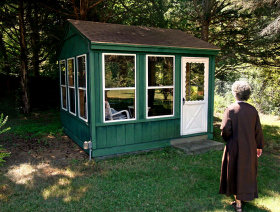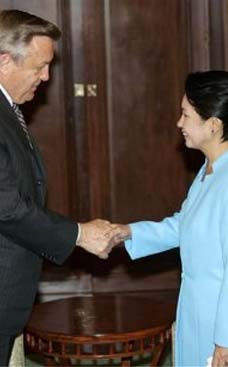
“I came thinking that I’d get it out of my system, and that I’d probably be gone in a year.” But as they sometimes say, life is full of surprises. The former Catholic school teacher and former Peace Corps volunteer in Venezuela had always enjoyed travel and had once met Mother Teresa on a trip to India. But she says her life as a Carmelite has connected her to the world even more. A native of Saco, Maine, the 60-year-old prioress leads a community of 14 nuns, members of the Discalced or “barefoot” Carmelites, in a monastery at 25 Watson Ave., just a short walk from Narragansett Bay. “A man once asked me, ‘Why waste your time praying all day. Why don’t you do something important?’ Well, what we do is of ultimate importance,” the prioress says.
Venezuela RPCV Sister Susan Lumb recalls that when she entered the Carmelites 14 years ago for a life of prayer as a cloistered nun she didn’t really think she would last
The house of quiet
01:00 AM EDT on Sunday, July 22, 2007
By Richard C. Dujardin
Journal Religion Writer
Sister Lumb walks toward a small building on the monastery grounds used for quiet contemplation and prayer.
BARRINGTON — Sister Susan Lumb recalls that when she entered the Carmelites 14 years ago for a life of prayer as a cloistered nun she didn’t really think she would last.
“I came thinking that I’d get it out of my system, and that I’d probably be gone in a year.”
But as they sometimes say, life is full of surprises. The former Catholic school teacher and former Peace Corps volunteer in Venezuela had always enjoyed travel and had once met Mother Teresa on a trip to India. But she says her life as a Carmelite has connected her to the world even more.
A native of Saco, Maine, the 60-year-old prioress leads a community of 14 nuns, members of the Discalced or “barefoot” Carmelites, in a monastery at 25 Watson Ave., just a short walk from Narragansett Bay.
“A man once asked me, ‘Why waste your time praying all day. Why don’t you do something important?’ Well, what we do is of ultimate importance,” the prioress says.
Sister Genevieve Lawler, a native of Buford, Ga., says such a life probably doesn’t make sense to someone who doesn’t believe in the power of prayer. “But we believe it, and that’s why we’re here. Prayer is still our main ministry,” she says. “What keeps us here is our love of Jesus and our love for the world.”
The Carmelites here have several reasons to celebrate right now. With 800 monasteries around the world, including 65 in the United States, the nuns and friars are marking the 800th anniversary of their founding in 1207, when after the Third Crusade a band of lay hermits, seeking to follow in the footsteps of Jesus and inspired by the spirit of the Old Testament prophet Elijah, sought to live a life of prayer and contemplation on Mount Carmel in the Holy Land.
In recognition of that milestone, the Carmelites are sponsoring a five-day conference at the Crowne Plaza hotel in Warwick, starting Wednesday, exploring the “prophetic dimension” of the Carmelite rule. It is expected to draw 250 participants from across the United States, including friars, nuns, friends and their lay counterparts.
Among the dozen speakers will be Barrington’s former prioress, Sister Vilma Seelaus, who has published extensively on the Carmelite mystical tradition.
“Even people who pray frequently sometimes get a sense of spiritual dryness,” she says, “because their understanding of God is no longer adequate to their experience. They are in fact being invited into a deeper relationship with God.”
The keynote speaker at the conference will be the Rev. Kevin Culligan, who has written extensively on Carmelite spirituality and who lives in a Carmelite community in Hinton, W.V. The friar is expected to argue in a keynote speech that in addition to prayer, Carmelites’ spirituality must extend to promoting the church’s teachings on peace and justice, confronting America’s “disordered attachment” to military power, and calling people to moral and spiritual renewal.
The nuns in Barrington say they have no problem with that message.
“Our prayer encompasses all those causes and issues,” says Sister Lumb. “Our prayers are having an impact. By the way, we should tell [New England Patriots owner Robert] Kraft that he has another weapon on the Patriots’ behalf. At least six of the sisters here are strong Patriots fans who pray for them in every game.”
Sister Seelaus, a native of Philadelphia, says the nuns are guided by the thought that what they do in their day-to-day life also has an effect on the world. Close living with the same people day in and day out, the nuns agree, may have its “rubs,” but in the end the world is better for it if they strive to become a loving community.
“If 14 of us can’t make it, how can we expect the rest of the world to?” Sister Seelaus asks. “Someone once asked Carl Jung [the founder of analytical psychology] if he thought we were going to blow ourselves up in a nuclear explosion. He replied that if there were enough persons in the world who have peace in their hearts, the collective energy of that peace will avert a catastrophe. That’s what we believe. We believe in the power of love.”
THE NUNS credit Emilie Post, the great granddaughter of Cornelius Vanderbilt and a prominent Newport socialite, with being the catalyst that brought the Carmelites to Rhode Island 77 years ago. A convert to Catholicism, Post took a group of six nurses to France after her husband’s death in 1915 in an attempt to help the wounded during World War I. She became acquainted with the Carmelite nuns there. In 1924, she moved to the French village of Lisieux in the Normandy region and developed a relationship with the biological sisters of one of Catholicism’s famous saints, St. Therese of Lisieux, herself a Carmelite nun.
On her return to Newport in 1927, Post began pressing to have a Carmelite monastery founded in Rhode Island — offering Stoneleigh, her manor house on Narragansett Avenue, as a possible convent. Three years later, three Carmelite nuns from New Orleans arrived in Rhode Island.
Despite setbacks and illnesses that almost sent them packing back to Louisiana, the nuns persevered. By the 1950s their community had grown so large they needed more room. The then-bishop of Providence, the Most Rev. Russell McVinney, responded to their predicament by providing them with a new monastery, the one they now use, at a former diocesan camp in Barrington.
It was exactly 50 years ago this September that the nuns moved into their Barrington monastery, one that has also become a spiritual oasis over the years for scores of lay people who seek to live in the way of the Carmelites outside the convent and monastery, as members of the Secular Order of Discalced Carmelites.
The nuns say that visits of the Secular Order add a vitality to their lives as nuns, and at the same time provide a source of renewal for the lay people who benefit from their presence.
HAS LIFE changed since their arrival here?
In some ways, yes. The strict code of silence that had to be adhered to in most parts of the house has been replaced by an “atmosphere of quiet,” in which the nuns no longer have to use sign language or notes to communicate, but can quietly speak if necessary.
The heavy woolen habits of the past have been replaced by lighter, modified habits, and if the nun chooses, a more secular wardrobe of brown and white. Though discalced can mean barefoot or sandal-clad, symbolic of their embrace of a simpler life, there has never been a time when the nuns have gone without sandals or shoes.
Gone too are the iron grills that used to separate the nuns from visitors in the days before Vatican II in the early 1960s. There are still cloistered areas reserved for the sisters, but what separates the sides now are ordinary doors. Living spaces are 6-by-8-foot cells with a bed, a chair, a chest and a desk.The day begins at 6 a.m. with an hour of personal prayer followed by Morning Praise at 7 a.m. and Mass at 7:30. Later in the day there are more recitations of the Liturgy of the Hours at 11:45 a.m., 4:30 and 8 p.m.
In between, each sister works alone on her own job. Sister Jean Elliott, for example, makes religious greeting cards; another mounts icons on wood. The items are sold by the order in their giftshop. Another nun is on duty handling prayer requests that come by phone or mail or in person. Others mow lawns or do the gardening. Then there are scholarly studies, and general cleaning.
Except for the two nuns designated to buy food and other items, and the sister authorized to go out and deliver lectures, the nuns stay on the monastery grounds, sometimes using their free periods in the afternoon to walk on the beach or to make use of two small buildings on the grounds for quiet contemplation and prayer.
While some of the nuns regularly watch TV news — saying they need to watch in order to offer up-to-date prayer petitions — a good many lean toward getting the news from print and are committed newspaper readers.
The sisters note that for the first time they can remember they have a woman from Rhode Island in formation (in training) — a 43-year-old former Catholic school teacher who entered last December. The ages of the sisters span several decades — with 9 of the 14 in their 70s and 80s.
Each Carmelite has her own story to tell, but Sister Seelaus, who is 82, has a story that goes back the longest. She traces her vocation to when she was 4 years old and “a sense of God’s presence took hold of me and took over my life.”
“Nothing else satisfied me,” she says, recalling how she entered the Carmelites when she was 21.
She has never looked back.
rdujardi@projo.com



















